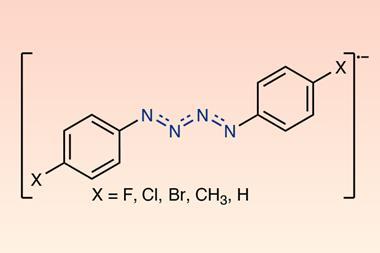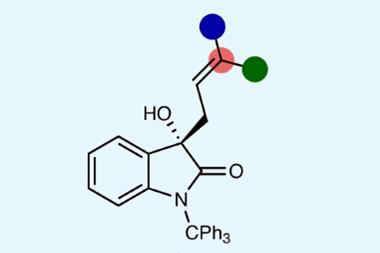Manufacturing chemists face worldwide job cuts
Bristol-Myers Squibb (BMS) has become the latest pharmaceutical company to announce a cost-saving restructuring plan that will slash manufacturing jobs. The US drug maker will scale down in its manufacturing operations, cutting its workforce by 4800 - about 10 per cent - by 2010. The plan is projected to save the firm an estimated $1.5 billion (£735 million).
Jeffrey Macdonald from BMS told Chemistry World that some 1300 cuts had already been made, with the rest expected before the end of 2008. The closure of one manufacturing plant in Panama has already been announced.
Carlo de Notaristefani, president of technical operations for BMS, said that the company would focus manufacturing, packaging and distribution operations on fewer, specialised sites.
In another money-saving plan, US chemicals giant Dow will cut 1000 jobs, and close plants in the US, Brazil and France. The restructuring will cost $600 million to put in place but is expected to save the company $180 million per year by 2010.
Dow’s styrene plant in Camaçari, Brazil, will stop production from this month. Dow will also exit the automotive sealers business in the US, Asia and Latin America within the next 18 months. ’We will explore strategic options in Europe . and want to focus resources on delivering differentiated and higher value technologies to the automotive industry,’ the company said in a statement.
Most of the job losses will be in the US, as the company closes plants in Louisiana and West Virginia. Analysts have suggested the moves are a prelude to Dow divesting part of its commodity chemicals business to concentrate on speciality chemicals.
Victoria Gill
A fine mess
The European Commission has fined five chemicals companies a total of €243 million (£175 million) for running a nine-year European chloroprene rubber cartel. Commission officials say Germany’s Bayer, US firms DuPont and Dow, Eni of Italy and Japan’s Tosoh and Denka met regularly to discuss prices. Bayer escaped a fine by blowing the whistle on the cartel, which ran from 1993 to 2002.
Healthy outlook
US chemicals companies will continue to see production volumes growth in 2008 and 2009, as strong foreign economic growth, and the weak US dollar, counter the slowdown in the domestic economy, the American Chemistry Council (ACC) has forecast. The ACC says shipments totalled a record $639 billion (£312 bilion) in 2007, and should hit $675 billion by 2009.
Catalyst for growth
UK catalyst and fine chemicals company Johnson Matthey is to build two new plants to make diesel engine emission-control catalysts. The two plants, a £34 million facility in Macedonia and a £21 million plant in the US, will serve the growing demand as Europe and the US tighten vehicle emission regulations. The company has also agreed to buy German catalyst group Argillon for €214 million.
GSK pipeline
The UK’s GlaxoSmithKline has agreed to buy US pharmaceuticals firm Reliant for $1.65 billion - acquiring the US rights to heart disease drug Lovaza in the process. Reliant made $341 million in net sales in the first nine months of the year, $206 million of which came from Lovaza, with sales expected to grow further. GSK has also received a boost from clinical trials of its rotavirus vaccine Rotarix, which showed it to be effective against the five most commonly circulating types of the gastroenteritis-causing bug. The disease kills over 600,000 children every year, primarily in the developing world.
Blastin’ Avastin
A US Food and Drug Administration (FDA) advisory panel has recommended that Genentech’s blockbuster Avastin not be approved to treat breast cancer, citing a lack of proven survival benefit and the drug’s toxic side-effects. The medicine, which earned $1.85 billion worldwide in 2006, is already approved for certain colon and liver cancers, and received European approval for breast cancer in March 2007.
Closer ties
Swiss drug company Novartis and German biotech MorphoSys have announced a 10-year deal to discover and develop antibody-based biologic drugs for a wide range of diseases. Novartis will pay over $600 million in fees and funding over the lifetime of the deal, with further payments depending on achievement of certain significant milestones.
Complex deals
French firm Total and Algeria’s Sonotrach have agreed to build a $3 billion petrochemicals plant in Arzew, Algeria. Both companies have conducted feasibility studies for the facility, which they plan to open within five years. The cracker, to be fed by gas fields in southern Algeria, will have a capacity of 1.4 million tonnes per year.
Intercontinental
French pharmaceuticals firm Sanofi-aventis, and Astellas Pharma, Japan’s second-largest drug company, have become the latest drugmakers buying into biotech. Astellas has agreed to acquire US biotech firm Agensys for up to $537 million. Agensys, which specialises in antibody technology, has at least seven potential cancer treatments in development. Meanwhile, Sanofi has increased its stake in US biotech firm Regeneron from 3 to 19 per cent, at a cost of $400 million, boosting the French firm’s biologics pipeline.
Italian job
Dow is to spend $20 million expanding its facilities at Correggio, Italy - and will make the plant its global R&D centre for polyurethane formulation and application technology. The company also plans to increase styrofoam production capacity at the site. Dow recently completed the acquisition of three epoxy systems formulators - GNS Technologies and Poly-Carb in the US, and UPPC in Germany.
Battery films head to market
ExxonMobil Chemical, and the US firm’s Japanese affiliate Tonen Chemical, have launched a new polymer film for lithium ion batteries, which the companies claim will speed the technology’s adoption in electric vehicles. Lithium ion batteries are light and have a high charge density - but haven’t been adopted in vehicles due to power, safety and cost issues.
The new film, a porous layer consisting of two co-extruded polymers rather than the usual single polymer, sits between the battery’s anode and cathode. The film controls the rate of energy release, and will shut an overheating battery down by partly melting, sealing the pores. Using a bilayer film improves the properties - it maintains its structure significantly above the shutdown temperature, improving safety, and it can be made more porous, boosting battery power.
’We’re preparing for a broad launch of the product with major automotive manufacturers,’ Toten president Dan Schuessler told Chemistry World. ’It’s only a matter of time before the technology goes into the mainstream.’
Meanwhile, German battery maker Li-Tec says it has made a lithium battery separator that is a flexible ceramic membrane, enhancing thermal stability.
Russian investments
The Russian government has announced it will build six major new chemicals plants by 2015 - at a reported cost of $164 billion. The country is seeking to increase domestic production of value-added products, such as plastics, to supply growing industries such as car manufacture, said Energy and Industry Minister Viktor Khristenko, and to boost the chemical industry’s contribution to GDP from 1.7 to 3 per cent.
Pain for Prexige
Novartis’s painkiller Prexige has been suspended from sale in Europe, over safety concerns about links to liver damage. The European Medicines Agency has said the drug’s risks outweigh the benefits. The drug has already been withdrawn in Australia and Canada, and was refused approval by the US FDA, due to safety fears. Like Merck’s infamous Vioxx, withdrawn in 2004, Prexige is a Cox 2 inhibitor.
Buying Biotech
US biotechnology company Celgene has agreed to buy Pharmion for $2.9 billion in cash and stocks. Colorado, US-based Pharmion’s biggest drug is Vidaza, a blood cancer treatment which analysts have suggested could become a billion dollar product.
Algal fuels
Shell and HR Biopetroleum have announced that they will build a pilot plant in Hawaii, US, to produce biofuels from algae. Shell says algae are promising biofuel producers because they grow rapidly, contain high levels of oils, and can be cultivated in seawater, minimising their impact on agrocultural land and fresh water supplies.
Coughing up
British group Reckitt Benckiser has agreed to buy US pharmaceutical company Adams Respiratory Therapeutics in a $2.3 billion cash deal. Buying Adams gives Reckitt entry into the US market, and ownership of two cough mixture brands, currently sold only in the US.
Flu drug psychiatric warning
An expert panel has endorsed an FDA proposal that flu drugs Tamiflu and Relenza display warnings about possible psychiatric side-effects. Roche’s Tamiflu was being taken by five Japanese children who became delirious and died, and GSK’s Relenza has also been linked with abnormal behaviour, the FDA noted - although whether the deaths and abnormal behaviour were caused by the drugs, or the flu virus, is yet to be established. Tamiflu made
$257 million for Roche in the third quarter, 62 per cent down on last year. Relenza sales also fell 7 per cent in the same quarter.
Flower power
Following EC approval, UK chemicals company Ineos has formed a joint venture to expand production at its Baleycourt biodiesel facility in France, from 110,000 to 230,000 tonnes by 2008. Ineos, along with farming cooperative SICLA and oil-seed crushing group C Thywissen, will invest over €70 million in the plant, which will convert around 400,000 tonnes of locally produced rapeseed into oil and then biodiesel. The company wants European biodiesel output of two million tonnes by 2020.
New drug-coated stent
An FDA external panel has recommended that the regulator approve Abbott Laboratories’ drug-eluting heart stent Xience, despite a lack of information about long-term safety. The panel said the FDA should require a post-market study on longer term effects. However, just days after receiving the panel’s backing, Abbott announced 1200 job cuts at plants in the US and Ireland that make its vascular products. Annual sales of drug-coated stents have fallen by $1 billion since concerns were raised that they could trigger potentially fatal blood clots, sometimes years after being implanted.
Higher drug costs?
The UK’s Office of Fair Trading has found that exclusive drug distribution deals, such as the agreement between Pfizer and distributor Unichem, pose a ’significant risk’ of raising drug costs. Pfizer has said the agreement is a way to tackle the rise of fake medicines, and hasn’t increased the costs - but the OFT report said the deal could cost the NHS millions of pounds. Other pharmaceutical companies, including Novartis and AstraZeneca, are also considering changing their distribution channels.
High profile trial
US pharmaceutical company Merck has said it will start Phase III trials for anacetrapib, a drug that raises HDL, so-called good cholesterol, and lowers bad cholesterol, LDL. Any such drug that makes it to market is a likely blockbuster - but Pfizer’s torcetrapib, in the same drug family, surprisingly failed Phase III trials, having cost the company almost a billion dollars to develop and test.
GSK’s R&D heads east
GlaxoSmithKline will spend $100 million developing a neuroscience research centre in China. The Shanghai facility will become GSK’s sole research centre for neurodegenerative diseases, including Alzheimer’s and Parkinson’s. The company plans to have 1000 scientists working at the centre within six years. Several other pharma firms, including AstraZeneca and Novartis, are also investing in Chinese R&D sites
Bigger biofuels
Finnish refiner Neste will spend 550 million to build the world’s largest biodiesel plant, the company has announced. The Singapore facility, which will primarily use palm oil from Malaysia and Indonesia, is due to be completed in 2010.
Bayer China chair
German chemicals firm Bayer has endowed a chair of sustainable development at Tongji University in Shanghai, China. Professor Du Qun took up the position on 1 January 2008. The endowment totals $1 million over five years.
Merger moves closer
US chemicals firm Lyondell Chemical Company shareholders have voted to approve the acquisition of the company by Dutch firm Basell for $48 per share. The EU has already cleared the deal. Once the $12 billion agreement completes, the combined company will be known as LyondellBasell Industries.
First liver cancer therapy
Nexavar has become the first FDA-approved drug to treat an inoperable form of liver cancer - the third largest cause of cancer-related deaths globally. The Bayer/Onyx Pharmaceutials drug is already approved for advanced kidney cancer.
Organon sale completes
US drug firm Schering-Plough has completed its €11 billion purchase of Organon BioSciences from Dutch firm Akzo Nobel. Akzo plans to use the cash in its acquisition of ICI.
Dow multi-billion deal
Dow is to sell 50 per cent of its plastics business to Kuwait Petroleum, forming an $11 billion joint venture. Dow will receive $9.5 billion for the stake, which it will use to buy into the higher growth speciality chemical sector.
Further Pfizer outsourcing
US pharma giant Pfizer said it is considering outsourcing up to 30 per cent of its manufacturing, primarily to Asia. The company currently outsources 15 per cent of manufacturing, and is looking to make further cost savings.
Big deal
French nuclear energy giant Areva has secured a deal worth €8 billion to build and fuel two new nuclear reactors in China. Areva’s EPR reactors, at 1600MW capacity, are the most powerful of the third generation of nuclear power plants.
Up in smoke?
US government scientists are investigating whether Pfizer’s antismoking drug Chantix can trigger suicidal thoughts and aggressive behaviour. The Australian authorities have already stipulated that the drug must carry warnings of links with suicidial thoughts.
Axcan buyout
Texan private equity firm TPG Capital has agreed to buy Canada’s Axcan Pharma in a $1.3 billion cash deal. Axcan, who specialises in gastrointestinal treatments, posted fourth quarter earnings of $16.8 million - double its equivalent 2006 earnings - on the back of strong prescription growth.
MGI sold
Japanese pharmaceutical company Eisai is to buy US firm MGI Pharma for $3.9 billion in cash. The MGI board are reported to have unanimously backed the deal, which will improve Eisai’s anti-cancer drug portfolio and pipeline.
Manufacturing agreement
Dutch firm DSM’s Anti-Infectives group has signed a manufacturing deal with India’s Arch Pharmalabs. The companies are aiming to tap into the growing demand for generic drugs, particularly in the rapidly growing markets of Asia.
Novartis to cut more jobs
Swiss pharmaceuticals firm Novartis has said it will cut 2500 jobs worldwide, as part of a global restructuring. The $450 million restructure was announced just months after the company said it would cut 1260 sales staff, primarily in the US.












No comments yet